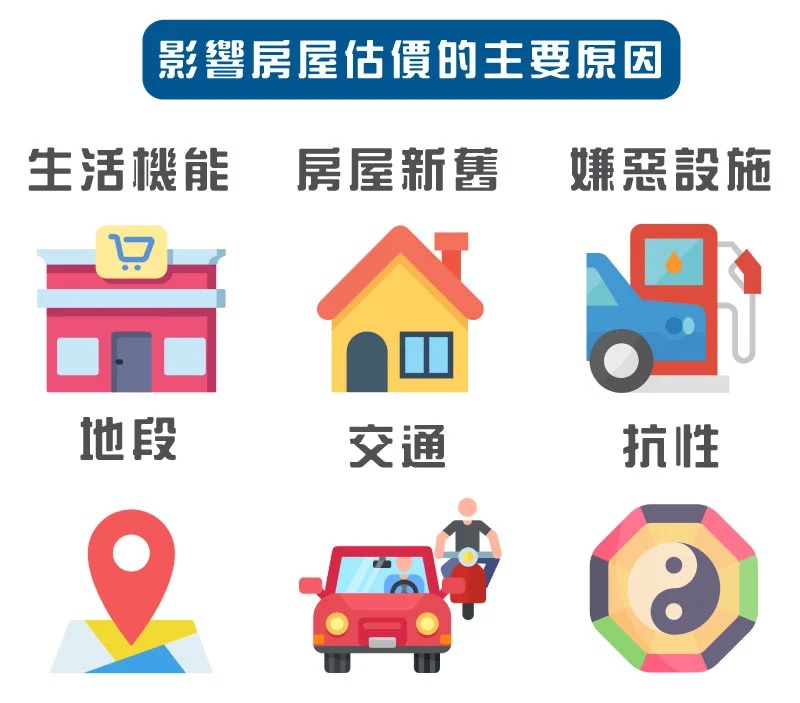「不動產估價師法」明文規定不動產估價師必須通過考試取得專業證照外,須有兩年的估價實務經驗並領有不動產開業證書後,始能正式執業,不動產鑑價將比照會計師,正式邁向證照與簽證制,此法案的通過,對導正不動產估價的市場秩序,將有積極的正面影響。
不動產估價師法第十四條規定:「不動產估價師受委託人之委託,辦理土地、建築改良物、農作改良物及其權利之估價業務。」 估價師任務如下:
一、 金融機構不動產抵押擔保物之估價。
二、 公開發行公司不動產買賣交易之估價。
三、 法院民事執行處拍賣不動產之估價。
四、 法院民事糾紛有關土地分割、合併等之估價。
五、 都市更新權利變換前後不動產價值之估價。
六、 聯合開發有關政府、地主、投資者之權益價值估價。
七、 土地開發合建分配之權益價值估價。
八、 土地重劃前後地主權益價值估價。
九、 區段徵收地主分配抵價地估價。
十、 政府公共工程徵收地上改良物之估價。
十一、 政府公共工程徵收農作改良物之估價。
十二、 政府公共工程土地徵收之估價。
十三、 不動產證券化之不動產開發價值之估價。
十四、 各項工程造價或鄰房損害之不動產價值減損之估價。
十五、 土地使用分區變更前後之價值差異估價。
十六、 會計作業對不動產以最近日期重新估價。
十七、 企業購併對不動產價值之估價。
十八、 企業投資以不動產作價入股之估價。
十九、 各級政府公有不動產標售、買賣之估價。
二十、 移民國外有關之不動產價值之估價。
二十一、 不動產權利(地上權、抵押權等)之估價。
二十二、 其他土地、建築改良物、農作改良物及其權利之估價。
不動產估價師的主要業務範圍,包括:金融機構抵押放款擔保品估價、法拍屋底價訂定之估價、證券化不動產估價、都市更新權利變換價值評估、會計財務公報10號、35號以時價認定資產價值、銀行不良資產評價…等。

- 什麼是不動產估價
不動產估價是指對:房產、土地、森林、構築物…等。不動產進行價值評估
- 不動產估價的內容
其是以不動產為對象,由專業估價人員,根據估價目的,遵循估價原則,按照估價程式,選用適宜的估價方法,在綜合分析影響不動產價格因素的基礎上,對不動產在估價時的客觀合理價格或價值進行估算或判定的活動。其意義在於:為不動產市場交易提供客觀標準;不動產資產的價值化更有利於優化資源配置;公平賦稅等。
根據估價目的、遵循估價原則,按照估價程式,選用適宜的估價方法,併在綜合分析影響不動產價格因素的基礎上,對不動產在估價時點的客 觀合理價格或價值進行估算和判定的活動。需把握兩點:(1)不動產估價是科學與藝術的有機結合;(2)不動產估價是把客觀存在的不動產價格揭示、顯現出來。
- 不動產估價的意義
一、為不動產市場交易服務
由於不動產產品自身的特點,如位置的固定性、質量的差異性、使用的耐久性或持久性、利用的限制性、價格的昂貴性等,使得不動產市場有不同於一般市場的特征。
二、有利於提高不動產經濟運行效率
不動產經濟運行的過程,是不動產經濟資源(如土地、建材、技術、資金、勞動力)要素配置的過程。
三、確立公平的收益分配製度的基礎
公平的收益分配製度是經濟運行的基礎和根本保證,對於不動產業來講,也是如此。在不動產開發經營過程中,其收益分配問題涉及不動產的多元產權主體、多元投資主體。
四、有利於稅負公平
由於不動產的地域性或異質性特征,不同地區或同一地區不同地點乃至同一道路的兩邊、同一棟樓的不同層次價格都會有很大的差異,如果公按不動產的面積徵稅,則會造成嚴重的稅負不公平;若根據該物業的收益價格來徵稅,則相對公平。據此,從一個城市來看,總體而論市中心的不動產價格相對昂貴,賦稅就重;而越遠離市中心,不動產價格相對越低,則賦稅越輕。
不動產估價是對不動產的客觀合理價格或價值的估算和判定,客觀合理價格或價值是估價對象在某種估價目的的特定條件下形成的正常價格,它能為當事人或社會一般人所信服和接受,為當事人提供公平可信的價格參考依據。但是它並不取代當事人的民事權利。不動產定價往往是當事人的行為,不動產的最終成交價格是由當事人自己決定的。當事人出於某種目的可以使其成交價格高於或低於正常價格,即當事人可以將其成交價格定為低於或高於評估價格。
前言:不動產估價師於製作估價報告書時除標示勘估標的之基本資料、價格日期及勘察日期、估價條件及估價目的外,於決定勘估標的價格前應敘明不動產價值的定義與種類。一般而言,「不動產估價技術規則」、國際評價準則(最新之國際評價準則為2012年版)及進行「企業評價」時,對於價格種類、價格標準及價格前提等,均有相似或不同之規定,對於初學者而言,常會造成混淆,因此,本期電子報將依「不動產估價技術規則」之規定作介紹,使讀者能有初步的瞭解。
依「不動產估價技術規則」之規定,估計價格種類有正常價格、限定價格、特定價格及較少使用的特殊價格等四種,而估計租金種類有正常租金及限定租金兩種。下方將為您介紹前述四種不動產估計價格之種類,讓大家對正常價格、特定價格、限定價格、特殊價格有約略的認識。惟如有錯誤或遺漏之處,仍尚請不吝賜教,萬分謝謝!
一、相關法規
何謂正常價格、特定價格、限定價格及特殊價格?大家或許都是一知半解,依據不動產價格種類及定義規範於不動產技術規則第二條(以下節錄介紹):
一、正常價格:
指具有市場性之不動產,於有意願之買賣雙方,依專業知識、謹慎行動,不受任何脅迫,經適當市場行銷及正常交易條件形成之合理價值,並以貨幣金額表示者。
二、限定價格:
指具有市場性之不動產,在下列限定條件之一所形成之價值,並以貨幣金額表示者:
(一)以不動產所有權以外其他權利與所有權合併為目的。
(二)以不動產合併為目的。
(三)以違反經濟合理性之不動產分割為前提。
三、特定價格:
指具有市場性之不動產,基於特定條件下形成之價值,並以貨幣金額表示者。
四、特殊價格:
指對不具市場性之不動產所估計之價值,並以貨幣金額表示者。
接下來就上述四種不動產價格種類作詳細介紹及舉例,讓讀者有概略的認識。
二、價格種類之介紹
(一)正常價格:
正常價格為一般估價報告書中最常使用之價格種類。所謂正常價格即是於公開市場經集體行為所創造的客觀價值。在理性、公開市場上,買賣雙方在資訊充分、不受脅迫利誘的情況下經正常交易時間而願意成交的價格為市場價格。不動產估價師透過市場價格行情與勘估標的作分析比較後,決定之價格,即為正常價格。
台灣不動產交易屬於公開市場,一般買賣物件皆可於各大房仲網供人瀏覽、比價,而內政部地政司及部分房仲業網站亦有提供區域成交行情可茲參考,未來透過「實價登錄」之實施,不動產交易愈透明,市場價格亦趨於健全、合理。
另外比較標的有下列情況,應先作適當之調整;該影響交易價格之情況無法有效掌握及量化調整時,應不予採用。
1.急買急賣。
2.期待因素影響之交易。
3.受債權債務關係影響之交易。
4.親友關係人間之交易。
5.畸零地或有合併使用之交易。
6.地上物處理有糾紛之交易。
7.法院拍賣。
8.受迷信影響之交易。
9.包含公共設施用地之交易。
10.人為哄抬之交易。
11.其他。
(二)限定價格:
依據不動產技術規則定義限定價格有以下三個要件:
1.具有市場性
2.限定條件之下
3.以貨幣金額表示
其內容有以下三大類:
一 以不動產所有權以外其他權利與所有權合併為目的。
包括土地所有權人購買租賃權、地上權或承租人購買租賃地、地上權人購買土地所有權等。透過上述之買賣,可擁有完全所有權,其可在該土地或不動產從事最高最有效利用。所以,在評估該不動產價值時,係以已完成產權合併前提下之不動產價格,此一價格將與正常市價有所差異,即形成限定價格。
二 以不動產合併為目的。
不動產合併能夠創造出合併後不動產之最有效利用時,被合併之不動產常能創造較高的附加價值。其合併之內容包含土地、建物及產權等。因此,其評估價格通常高於正常價格。
估價上常見案例如:某一宗地面積過小或畸零,無法自行開發利用,須經由與其他土地合併開發方能增加使用效益。在評估該宗地價值時,係以已完成合併前提下之價格,即形成限定價格。
三 以違反經濟合理性之不動產分割為前提。
不動產分割後,其不若分割前之最有效利用,往往使分割後的不動產價值降低,且低於正常價格的水準,此時之評估價格為限定價格。
(三)特定價格:
特定價格係指具有市場性之不動產,基於特定條件下形成之價值,並以貨幣金額表示者。若估價條件含有不確定性,則以特定條件敘明。特定條件舉例而言,指尚未實現,但基於法令、財務、市場、規劃等可行性分析之開發營運計畫條件。實際情形則須由不動產估價師於應用特定價格時,確實敘明該特定條件。
特定價格的案例包括:
1.企業在合併時之資產重新估價,如不動產投資信託或不動產證券化所作之估價。
2.特殊土地之估價:礦地、溫泉地等不動產估價。
3.依土地徵收補償之不動產價值。
(四)特殊價格:
特殊價格係指不具市場性之不動產所估計之價值,並以貨幣金額表示者。
由於該不動產具有獨特、不可取代性,無法以正常市場價值評估者,的案例包括:
1.學校、公園或軍事等公共設施或公益使用之不動產估價。
2.不以成交為目的之資產評估之不動產:如總統府、歷史、文化、宗教建物、世界文化遺產等。
三、結論
不動產技術規則第6條規定:「不動產估價,應註明其價格種類;其以特定價格或限定價格估價者,應敘明其估價條件,並同時估計其正常價格。」註明不動產價格種類,對於委託者、不動產估價師、使用報告者之間,都可確認不動產估價條件,並協助不動產估價師依據委託者提供之資料,針對不動產設定條件不同,選用及分析的適當估價方法,評估該不動產之價值。
一般估價報告書之鑑定價格種類仍以正常價格為主,若以限定價格、特定價格或特殊價格除作為評估價值參考依據時,除需說明評估限定、特定或特殊價值之原因外,仍需標示正常價格,除讓讀者明確了解不動產估價條件外,更可比較限定、特定或特殊價值與正常價格之差別。
買賣房子應慎選房仲代書!
加盟店不等於直營店-慎選房屋仲介三步驟
想要找金主、找代書當然要找30年最專業的~最有口碑!最有品質!最有信用!最有保障~這樣才能讓您獲得到迅速安全的高品質服務!!建議您在選擇代書之前要慎重,要明察。
本公司絕非地下錢莊高利貸,有政府核准、合法經營附有營利事業登記證。
代書經由案件分析詳細暸解,條件滿意在申辦。
你有需求、我有管道。
任何疑難雜症、我們有朝化解!
24小時服務專線:0979-893-889 宋智孝
公司地址:台中市北區北屯路49-3號
營業時間:上午8:00 ~ 下午5:00
LINE ID:0979893889


canadian discount pharmacy: Express Rx Canada – canadian pharmacy online
гинеколог цена абакан консультация гинеколога
варикоз конечностей лечение лечение варикоза врач
стоимость услуг клиники медицинский центр абакан
https://medicinefromindia.com/# indian pharmacy online
Премиальные шторы на заказ для вашего интерьера, для офиса.
Качественные шторы на заказ, быстро.
Создание штор мечты, под любой стиль.
Эксклюзивные шторы на заказ, подчеркивающие ваш стиль.
Заказать шторы на заказ для спальни, с индивидуальным подходом.
Надежное изготовление штор на заказ, по вашим желанием.
Создание штор на заказ из натуральных тканей, с учетом особенностей помещения.
Эксклюзивные шторы на заказ, по вашему желанию.
Минималистичные шторы на заказ, с учетом светотени.
Пошив штор на заказ по индивидуальным меркам, от ведущих мастеров.
Премиальные ткани для штор на заказ, под любой интерьер.
Пошив штор по индивидуальному проекту, с доставкой по Москве и регионам.
Стильные шторы по вашему проекту, под любой стиль интерьера.
Премиум шторы на заказ, по вашему проекту.
Создание уникальных штор для любой комнаты, от профессиональных мастеров.
Высококачественные шторы на заказ, по желанию клиента.
сшить шторы на заказ сшить шторы на заказ . Prokarniz
купить аккаунт продать аккаунт
купить аккаунт с прокачкой покупка аккаунтов
northwest canadian pharmacy: Express Rx Canada – canadian pharmacy meds
Закажите уникальные шторы на заказ, для офиса.
Идеальные шторы по вашим размерам, по выгодной цене.
Создание штор мечты, по вашим размерам.
Эксклюзивные шторы на заказ, подчеркивающие ваш стиль.
Пошив штор на заказ для кухни, с индивидуальным подходом.
Профессиональный пошив штор по вашим размерам, по вашим желанием.
Создание штор на заказ из натуральных тканей, по желанию.
Модные шторы на заказ, подчеркивающие вашу индивидуальность.
Современные шторы на заказ, с учетом светотени.
Создание штор для любого типа окна, от ведущих мастеров.
Премиальные ткани для штор на заказ, воплощая ваши идеи.
Пошив штор по индивидуальному проекту, по вашему желанию.
Стильные шторы по вашему проекту, от ведущих дизайнеров.
Премиум шторы на заказ, по вашему проекту.
Шторы на заказ с доставкой и монтажом, от профессиональных мастеров.
Эксклюзивные ткани для пошива штор, с гарантией долговечности.
сшить шторы на заказ сшить шторы на заказ . прокарниз
MedicineFromIndia: Medicine From India – Medicine From India
canada discount pharmacy Express Rx Canada canadian pharmacy tampa
what is sildenafil
canadian online pharmacy: Express Rx Canada – recommended canadian pharmacies
http://medicinefromindia.com/# indian pharmacy
medications without prescription
Закажите уникальные шторы на заказ, лучшие цены.
Премиальные шторы на заказ, с гарантией качества.
Создание штор мечты, по вашим размерам.
Эксклюзивные шторы на заказ, высокое качество материалов.
Пошив штор на заказ для кухни, с индивидуальным подходом.
Профессиональный пошив штор по вашим размерам, быстро и качественно.
Пошив штор для нестандартных окон, используя современные технологии.
Шторы на заказ с уникальным дизайном, от профессионалов.
Современные шторы на заказ, под любой интерьер.
Создание штор для любого типа окна, по вашему стилю.
Премиальные ткани для штор на заказ, с гарантией качества.
Изготовление штор на заказ быстро и недорого, с высоким качеством.
Элегантные шторы на заказ, под любой стиль интерьера.
Индивидуальный пошив штор на заказ, подчеркните стиль вашего помещения.
Шторы на заказ с доставкой и монтажом, от профессиональных мастеров.
Эксклюзивные ткани для пошива штор, с гарантией долговечности.
сшить шторы на заказ сшить шторы на заказ . Prokarniz
маркетплейс аккаунтов соцсетей покупка аккаунтов
продать аккаунт покупка аккаунтов
Закажите уникальные шторы на заказ, отличное качество.
Идеальные шторы по вашим размерам, по выгодной цене.
Изготовление штор на заказ, под ваш интерьер.
Лучшие ткани для штор на заказ, подчеркивающие ваш стиль.
Пошив штор на заказ для кухни, под ваш вкус.
Надежное изготовление штор на заказ, быстро и качественно.
Пошив штор для нестандартных окон, по желанию.
Модные шторы на заказ, от профессионалов.
Минималистичные шторы на заказ, с учетом светотени.
Шторы на заказ с учетом ваших пожеланий, по вашему стилю.
Креативные шторы на заказ, воплощая ваши идеи.
Пошив штор по индивидуальному проекту, с высоким качеством.
Модные шторы на заказ для вашего дома, под любой стиль интерьера.
Премиум шторы на заказ, с использованием лучших тканей.
Пошив штор по индивидуальному дизайну, под ваш вкус.
Эксклюзивные ткани для пошива штор, с гарантией долговечности.
сшить шторы на заказ сшить шторы на заказ . Прокарниз
MedicineFromIndia: Medicine From India – Medicine From India
mexican online pharmacy: Rx Express Mexico – Rx Express Mexico
Medicine From India: Medicine From India – indian pharmacy online
https://expressrxcanada.com/# legit canadian pharmacy
Deneme Bonusu Veren Siteler arasında özellikle CasinoFast, CasinoMobi, MilliCasino, CasinoLevant, Betpuan ve Betplay, sundukları cazip bonuslarla dikkat çekiyor
магазин аккаунтов социальных сетей магазин аккаунтов
Rx Express Mexico Rx Express Mexico Rx Express Mexico
биржа аккаунтов маркетплейс аккаунтов
Профессиональный сервисный центр по ремонту Apple iPhone в Москве.
Мы предлагаем: ремонт айфона на дому в москве
Наши мастера оперативно устранят неисправности вашего устройства в сервисе или с выездом на дом!
marley generics sildenafil
площадка для продажи аккаунтов покупка аккаунтов
Многолетний опыт наших специалистов позволяет выполнить курсовую работу по любому направлению с учётом всех требований вашего вуза. Гарантируем индивидуальный подход, соблюдение сроков и стопроцентную уникальность курсовые работы готовые
Hello guys!
I came across a 109 helpful page that I think you should visit.
This platform is packed with a lot of useful information that you might find valuable.
It has everything you could possibly need, so be sure to give it a visit!
https://www.ontimemagazines.com/tech-and-travel-simple-ways-to-make-both-fair/
https://bezdepster.buzz/
Практичные шторы для загородных интерьеров
шторы в загородном доме шторы в загородном доме .+7 (499) 460-69-87
Официальный сайт лордфильм лордфильм интерны смотреть онлайн смотреть зарубежные новинки онлайн бесплатно. Фильмы, сериалы, кино, мультфильмы, аниме в хорошем качестве HD 720
https://t.me/ramenbet_rus Онлайн-казино сделали азартные игры доступными для всех и каждого. Играть можно не выходя из дома, в любое время суток. Однако важно выбирать лицензированные и проверенные онлайн-казино, чтобы избежать мошенничества и обеспечить честную игру.
top 10 online pharmacy in india: indian pharmacy – Medicine From India
звёзды бизнеса
Rx Express Mexico: mexico pharmacy order online – mexico pharmacies prescription drugs
продажа аккаунтов площадка для продажи аккаунтов
Кайт Хургада
купить аккаунт площадка для продажи аккаунтов
Обзор популярных тканей для штор в загородных домах
шторы в загородном доме шторы в загородном доме .Ткацкий
https://expressrxcanada.com/# canadian pharmacy world
Готовы исследовать досконально о шестнадцатой школе городского округа Владимир?
Воспользуйтесь проверенный портал школьного учреждения: school16vlad.ru
В этом источнике вы обнаружите новейшую материалы о образовательной программе.
Сопутствующе размещены сведения для коммуникации руководства.
mexico pharmacies prescription drugs mexico drug stores pharmacies Rx Express Mexico
Элегантные шторы для загородного дома
шторы в загородном доме шторы в загородном доме .”Ткацкий”
рэп хип хоп андерграунд
En iyi deneme bonusu veren siteler ve popüler casino siteleri ile yüksek kazanç fırsatlarını keşfedin. Yeni siteler ve güncel bonuslar sizi bekliyor.